Applying Ethical Theories: The Impact of Driverless Trucks
VerifiedAdded on 2020/02/18
|7
|2254
|67
Essay
AI Summary
This essay critically examines the ethical implications of driverless trucks, focusing on their potential impact on Australian society. The author analyzes a news article discussing the introduction of this technology and its anticipated negative effects, including job losses for truck drivers and economic disruption for related businesses. The essay employs four classical ethical theories—utilitarianism, deontology, contract theory, and virtue ethics—to assess the moral permissibility of driverless trucks. The analysis explores how each theory views the benefits and drawbacks of this technology, considering factors such as overall happiness, duties and obligations, contractual agreements, and the virtues promoted. The essay concludes by summarizing the perspectives of each ethical theory, highlighting the conflicting views and the complex moral considerations surrounding the implementation of driverless truck technology and its broader societal impacts.
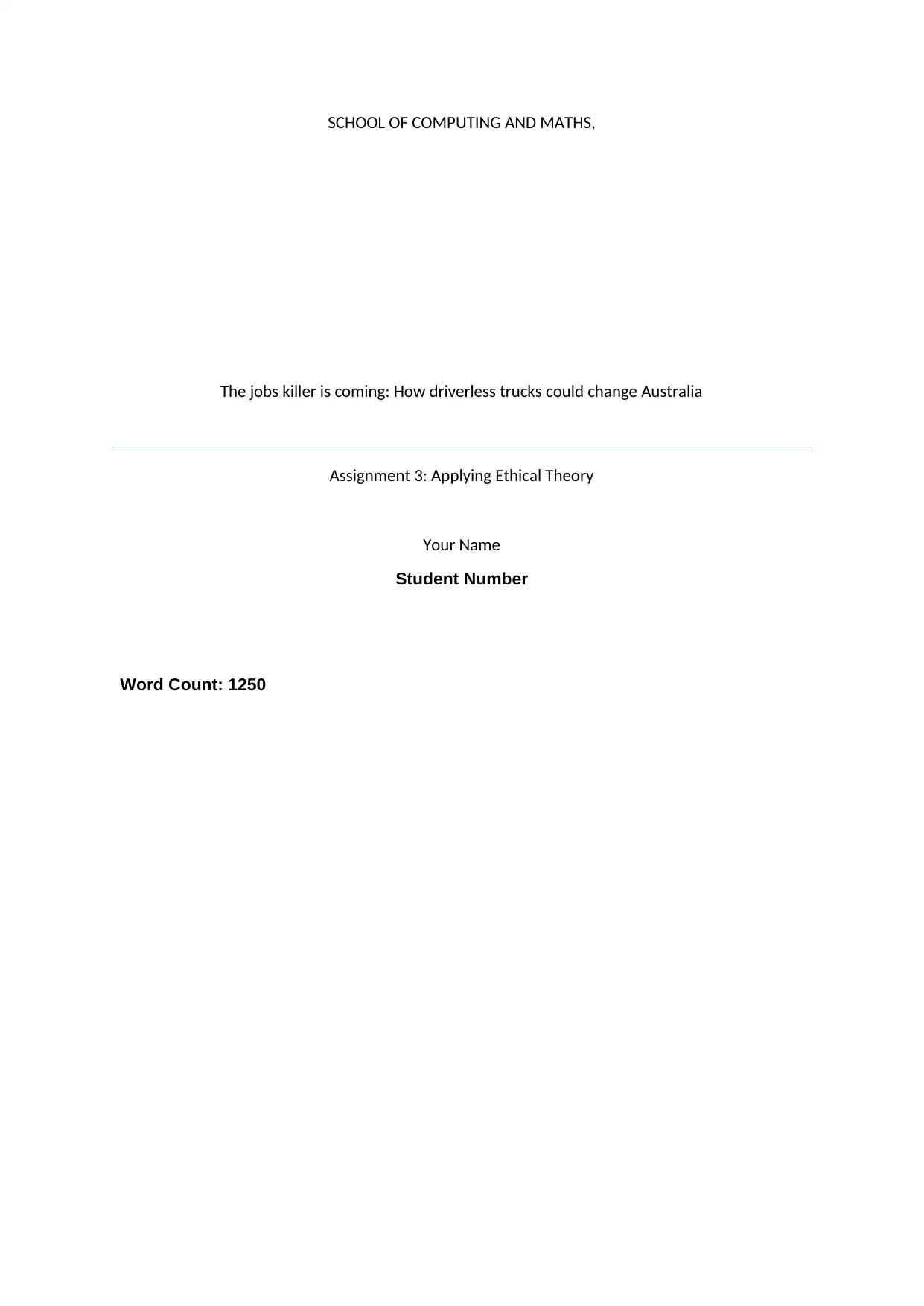
SCHOOL OF COMPUTING AND MATHS,
The jobs killer is coming: How driverless trucks could change Australia
Assignment 3: Applying Ethical Theory
Your Name
Student Number
Word Count: 1250
The jobs killer is coming: How driverless trucks could change Australia
Assignment 3: Applying Ethical Theory
Your Name
Student Number
Word Count: 1250
Paraphrase This Document
Need a fresh take? Get an instant paraphrase of this document with our AI Paraphraser
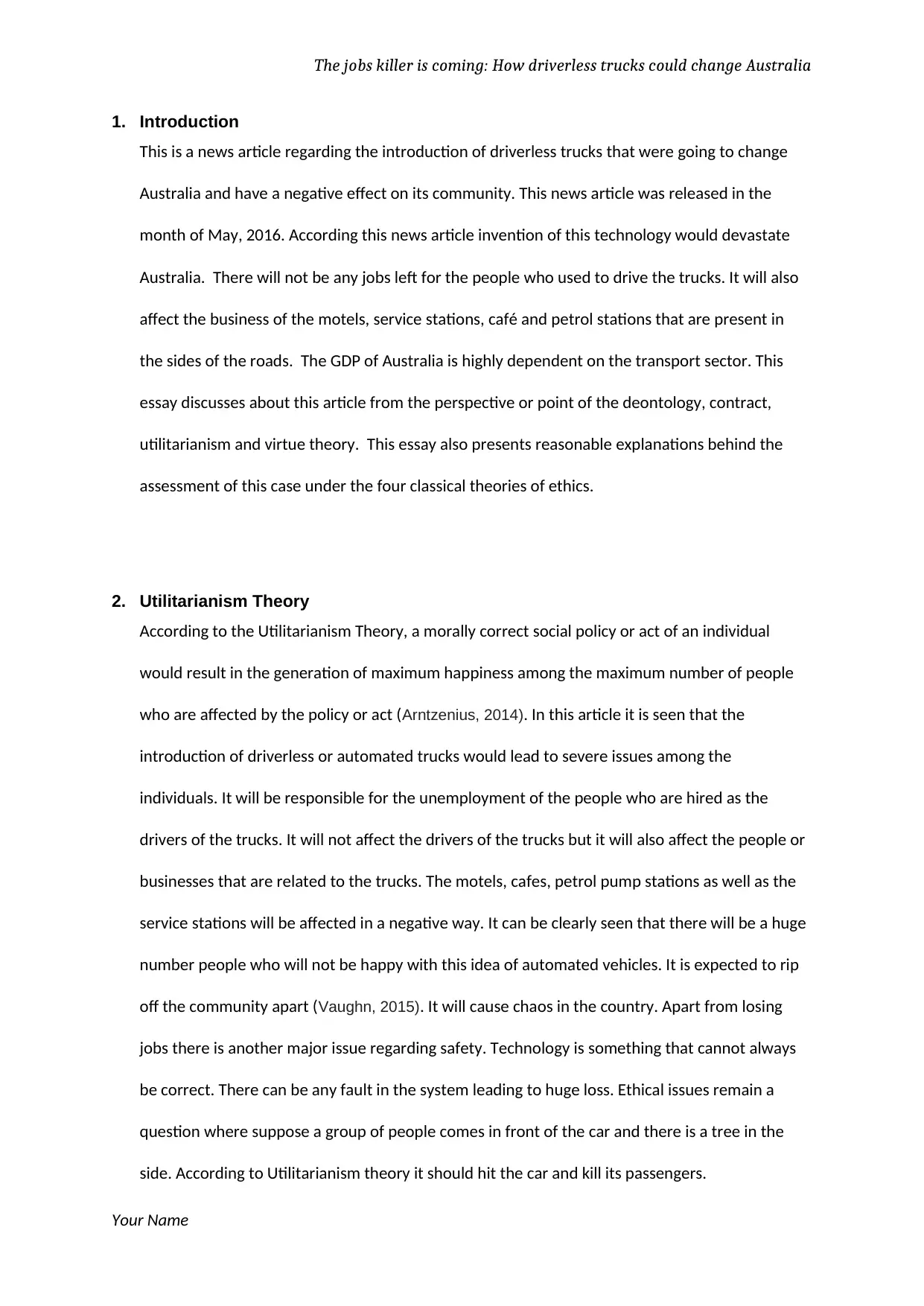
The jobs killer is coming: How driverless trucks could change Australia
1. Introduction
This is a news article regarding the introduction of driverless trucks that were going to change
Australia and have a negative effect on its community. This news article was released in the
month of May, 2016. According this news article invention of this technology would devastate
Australia. There will not be any jobs left for the people who used to drive the trucks. It will also
affect the business of the motels, service stations, café and petrol stations that are present in
the sides of the roads. The GDP of Australia is highly dependent on the transport sector. This
essay discusses about this article from the perspective or point of the deontology, contract,
utilitarianism and virtue theory. This essay also presents reasonable explanations behind the
assessment of this case under the four classical theories of ethics.
2. Utilitarianism Theory
According to the Utilitarianism Theory, a morally correct social policy or act of an individual
would result in the generation of maximum happiness among the maximum number of people
who are affected by the policy or act (Arntzenius, 2014). In this article it is seen that the
introduction of driverless or automated trucks would lead to severe issues among the
individuals. It will be responsible for the unemployment of the people who are hired as the
drivers of the trucks. It will not affect the drivers of the trucks but it will also affect the people or
businesses that are related to the trucks. The motels, cafes, petrol pump stations as well as the
service stations will be affected in a negative way. It can be clearly seen that there will be a huge
number people who will not be happy with this idea of automated vehicles. It is expected to rip
off the community apart (Vaughn, 2015). It will cause chaos in the country. Apart from losing
jobs there is another major issue regarding safety. Technology is something that cannot always
be correct. There can be any fault in the system leading to huge loss. Ethical issues remain a
question where suppose a group of people comes in front of the car and there is a tree in the
side. According to Utilitarianism theory it should hit the car and kill its passengers.
Your Name
1. Introduction
This is a news article regarding the introduction of driverless trucks that were going to change
Australia and have a negative effect on its community. This news article was released in the
month of May, 2016. According this news article invention of this technology would devastate
Australia. There will not be any jobs left for the people who used to drive the trucks. It will also
affect the business of the motels, service stations, café and petrol stations that are present in
the sides of the roads. The GDP of Australia is highly dependent on the transport sector. This
essay discusses about this article from the perspective or point of the deontology, contract,
utilitarianism and virtue theory. This essay also presents reasonable explanations behind the
assessment of this case under the four classical theories of ethics.
2. Utilitarianism Theory
According to the Utilitarianism Theory, a morally correct social policy or act of an individual
would result in the generation of maximum happiness among the maximum number of people
who are affected by the policy or act (Arntzenius, 2014). In this article it is seen that the
introduction of driverless or automated trucks would lead to severe issues among the
individuals. It will be responsible for the unemployment of the people who are hired as the
drivers of the trucks. It will not affect the drivers of the trucks but it will also affect the people or
businesses that are related to the trucks. The motels, cafes, petrol pump stations as well as the
service stations will be affected in a negative way. It can be clearly seen that there will be a huge
number people who will not be happy with this idea of automated vehicles. It is expected to rip
off the community apart (Vaughn, 2015). It will cause chaos in the country. Apart from losing
jobs there is another major issue regarding safety. Technology is something that cannot always
be correct. There can be any fault in the system leading to huge loss. Ethical issues remain a
question where suppose a group of people comes in front of the car and there is a tree in the
side. According to Utilitarianism theory it should hit the car and kill its passengers.
Your Name
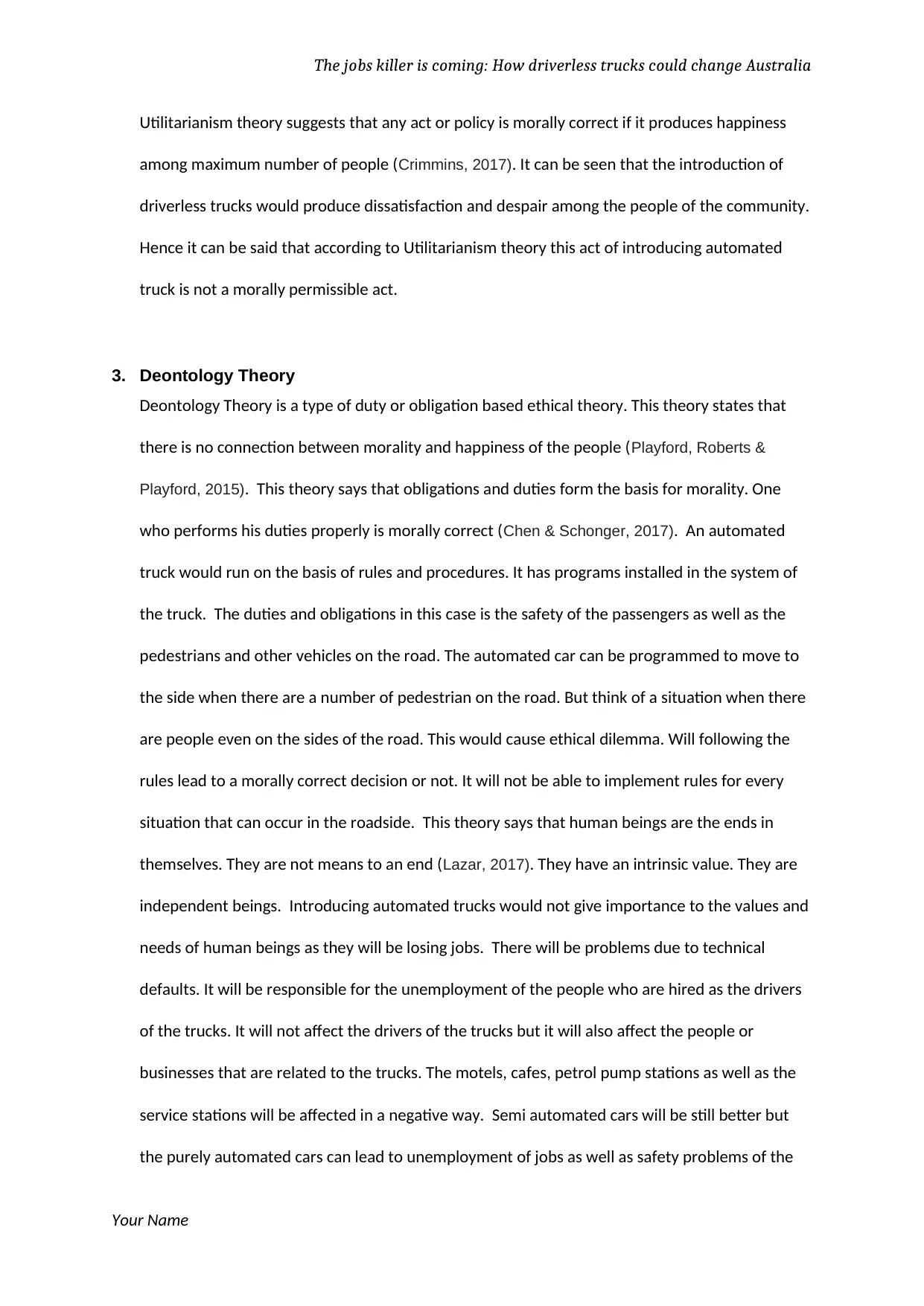
The jobs killer is coming: How driverless trucks could change Australia
Utilitarianism theory suggests that any act or policy is morally correct if it produces happiness
among maximum number of people (Crimmins, 2017). It can be seen that the introduction of
driverless trucks would produce dissatisfaction and despair among the people of the community.
Hence it can be said that according to Utilitarianism theory this act of introducing automated
truck is not a morally permissible act.
3. Deontology Theory
Deontology Theory is a type of duty or obligation based ethical theory. This theory states that
there is no connection between morality and happiness of the people (Playford, Roberts &
Playford, 2015). This theory says that obligations and duties form the basis for morality. One
who performs his duties properly is morally correct (Chen & Schonger, 2017). An automated
truck would run on the basis of rules and procedures. It has programs installed in the system of
the truck. The duties and obligations in this case is the safety of the passengers as well as the
pedestrians and other vehicles on the road. The automated car can be programmed to move to
the side when there are a number of pedestrian on the road. But think of a situation when there
are people even on the sides of the road. This would cause ethical dilemma. Will following the
rules lead to a morally correct decision or not. It will not be able to implement rules for every
situation that can occur in the roadside. This theory says that human beings are the ends in
themselves. They are not means to an end (Lazar, 2017). They have an intrinsic value. They are
independent beings. Introducing automated trucks would not give importance to the values and
needs of human beings as they will be losing jobs. There will be problems due to technical
defaults. It will be responsible for the unemployment of the people who are hired as the drivers
of the trucks. It will not affect the drivers of the trucks but it will also affect the people or
businesses that are related to the trucks. The motels, cafes, petrol pump stations as well as the
service stations will be affected in a negative way. Semi automated cars will be still better but
the purely automated cars can lead to unemployment of jobs as well as safety problems of the
Your Name
Utilitarianism theory suggests that any act or policy is morally correct if it produces happiness
among maximum number of people (Crimmins, 2017). It can be seen that the introduction of
driverless trucks would produce dissatisfaction and despair among the people of the community.
Hence it can be said that according to Utilitarianism theory this act of introducing automated
truck is not a morally permissible act.
3. Deontology Theory
Deontology Theory is a type of duty or obligation based ethical theory. This theory states that
there is no connection between morality and happiness of the people (Playford, Roberts &
Playford, 2015). This theory says that obligations and duties form the basis for morality. One
who performs his duties properly is morally correct (Chen & Schonger, 2017). An automated
truck would run on the basis of rules and procedures. It has programs installed in the system of
the truck. The duties and obligations in this case is the safety of the passengers as well as the
pedestrians and other vehicles on the road. The automated car can be programmed to move to
the side when there are a number of pedestrian on the road. But think of a situation when there
are people even on the sides of the road. This would cause ethical dilemma. Will following the
rules lead to a morally correct decision or not. It will not be able to implement rules for every
situation that can occur in the roadside. This theory says that human beings are the ends in
themselves. They are not means to an end (Lazar, 2017). They have an intrinsic value. They are
independent beings. Introducing automated trucks would not give importance to the values and
needs of human beings as they will be losing jobs. There will be problems due to technical
defaults. It will be responsible for the unemployment of the people who are hired as the drivers
of the trucks. It will not affect the drivers of the trucks but it will also affect the people or
businesses that are related to the trucks. The motels, cafes, petrol pump stations as well as the
service stations will be affected in a negative way. Semi automated cars will be still better but
the purely automated cars can lead to unemployment of jobs as well as safety problems of the
Your Name
⊘ This is a preview!⊘
Do you want full access?
Subscribe today to unlock all pages.

Trusted by 1+ million students worldwide
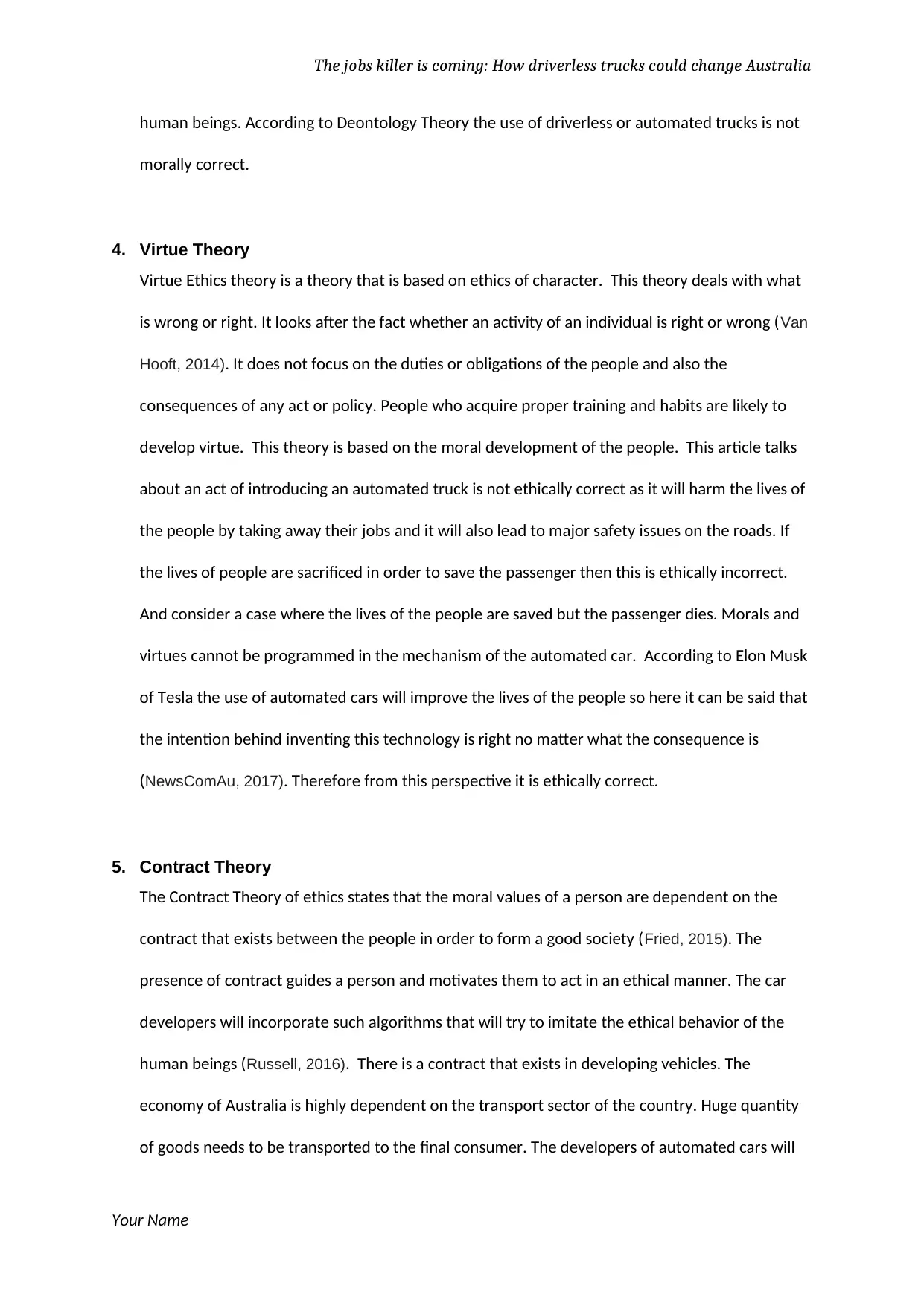
The jobs killer is coming: How driverless trucks could change Australia
human beings. According to Deontology Theory the use of driverless or automated trucks is not
morally correct.
4. Virtue Theory
Virtue Ethics theory is a theory that is based on ethics of character. This theory deals with what
is wrong or right. It looks after the fact whether an activity of an individual is right or wrong (Van
Hooft, 2014). It does not focus on the duties or obligations of the people and also the
consequences of any act or policy. People who acquire proper training and habits are likely to
develop virtue. This theory is based on the moral development of the people. This article talks
about an act of introducing an automated truck is not ethically correct as it will harm the lives of
the people by taking away their jobs and it will also lead to major safety issues on the roads. If
the lives of people are sacrificed in order to save the passenger then this is ethically incorrect.
And consider a case where the lives of the people are saved but the passenger dies. Morals and
virtues cannot be programmed in the mechanism of the automated car. According to Elon Musk
of Tesla the use of automated cars will improve the lives of the people so here it can be said that
the intention behind inventing this technology is right no matter what the consequence is
(NewsComAu, 2017). Therefore from this perspective it is ethically correct.
5. Contract Theory
The Contract Theory of ethics states that the moral values of a person are dependent on the
contract that exists between the people in order to form a good society (Fried, 2015). The
presence of contract guides a person and motivates them to act in an ethical manner. The car
developers will incorporate such algorithms that will try to imitate the ethical behavior of the
human beings (Russell, 2016). There is a contract that exists in developing vehicles. The
economy of Australia is highly dependent on the transport sector of the country. Huge quantity
of goods needs to be transported to the final consumer. The developers of automated cars will
Your Name
human beings. According to Deontology Theory the use of driverless or automated trucks is not
morally correct.
4. Virtue Theory
Virtue Ethics theory is a theory that is based on ethics of character. This theory deals with what
is wrong or right. It looks after the fact whether an activity of an individual is right or wrong (Van
Hooft, 2014). It does not focus on the duties or obligations of the people and also the
consequences of any act or policy. People who acquire proper training and habits are likely to
develop virtue. This theory is based on the moral development of the people. This article talks
about an act of introducing an automated truck is not ethically correct as it will harm the lives of
the people by taking away their jobs and it will also lead to major safety issues on the roads. If
the lives of people are sacrificed in order to save the passenger then this is ethically incorrect.
And consider a case where the lives of the people are saved but the passenger dies. Morals and
virtues cannot be programmed in the mechanism of the automated car. According to Elon Musk
of Tesla the use of automated cars will improve the lives of the people so here it can be said that
the intention behind inventing this technology is right no matter what the consequence is
(NewsComAu, 2017). Therefore from this perspective it is ethically correct.
5. Contract Theory
The Contract Theory of ethics states that the moral values of a person are dependent on the
contract that exists between the people in order to form a good society (Fried, 2015). The
presence of contract guides a person and motivates them to act in an ethical manner. The car
developers will incorporate such algorithms that will try to imitate the ethical behavior of the
human beings (Russell, 2016). There is a contract that exists in developing vehicles. The
economy of Australia is highly dependent on the transport sector of the country. Huge quantity
of goods needs to be transported to the final consumer. The developers of automated cars will
Your Name
Paraphrase This Document
Need a fresh take? Get an instant paraphrase of this document with our AI Paraphraser
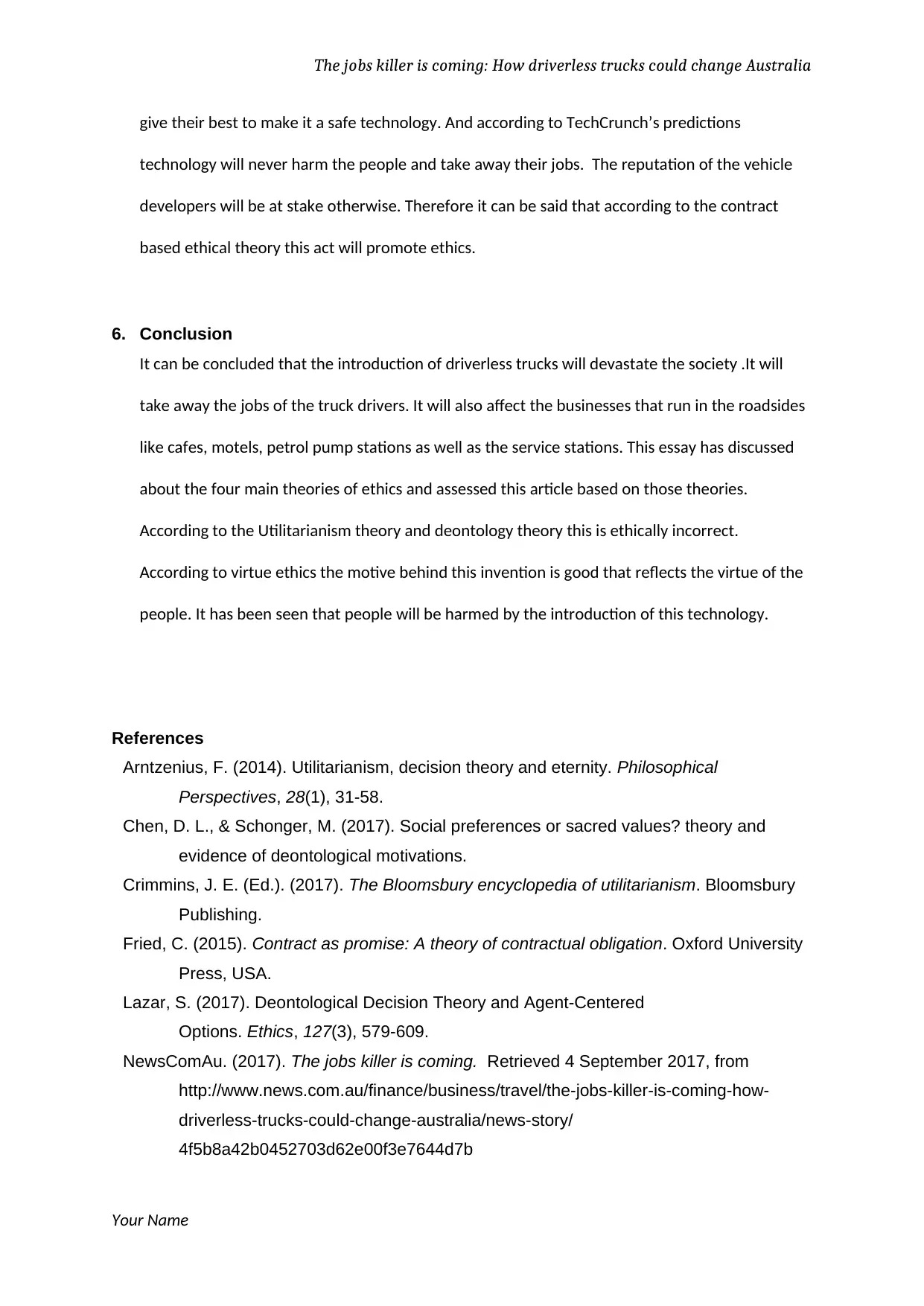
The jobs killer is coming: How driverless trucks could change Australia
give their best to make it a safe technology. And according to TechCrunch’s predictions
technology will never harm the people and take away their jobs. The reputation of the vehicle
developers will be at stake otherwise. Therefore it can be said that according to the contract
based ethical theory this act will promote ethics.
6. Conclusion
It can be concluded that the introduction of driverless trucks will devastate the society .It will
take away the jobs of the truck drivers. It will also affect the businesses that run in the roadsides
like cafes, motels, petrol pump stations as well as the service stations. This essay has discussed
about the four main theories of ethics and assessed this article based on those theories.
According to the Utilitarianism theory and deontology theory this is ethically incorrect.
According to virtue ethics the motive behind this invention is good that reflects the virtue of the
people. It has been seen that people will be harmed by the introduction of this technology.
References
Arntzenius, F. (2014). Utilitarianism, decision theory and eternity. Philosophical
Perspectives, 28(1), 31-58.
Chen, D. L., & Schonger, M. (2017). Social preferences or sacred values? theory and
evidence of deontological motivations.
Crimmins, J. E. (Ed.). (2017). The Bloomsbury encyclopedia of utilitarianism. Bloomsbury
Publishing.
Fried, C. (2015). Contract as promise: A theory of contractual obligation. Oxford University
Press, USA.
Lazar, S. (2017). Deontological Decision Theory and Agent-Centered
Options. Ethics, 127(3), 579-609.
NewsComAu. (2017). The jobs killer is coming. Retrieved 4 September 2017, from
http://www.news.com.au/finance/business/travel/the-jobs-killer-is-coming-how-
driverless-trucks-could-change-australia/news-story/
4f5b8a42b0452703d62e00f3e7644d7b
Your Name
give their best to make it a safe technology. And according to TechCrunch’s predictions
technology will never harm the people and take away their jobs. The reputation of the vehicle
developers will be at stake otherwise. Therefore it can be said that according to the contract
based ethical theory this act will promote ethics.
6. Conclusion
It can be concluded that the introduction of driverless trucks will devastate the society .It will
take away the jobs of the truck drivers. It will also affect the businesses that run in the roadsides
like cafes, motels, petrol pump stations as well as the service stations. This essay has discussed
about the four main theories of ethics and assessed this article based on those theories.
According to the Utilitarianism theory and deontology theory this is ethically incorrect.
According to virtue ethics the motive behind this invention is good that reflects the virtue of the
people. It has been seen that people will be harmed by the introduction of this technology.
References
Arntzenius, F. (2014). Utilitarianism, decision theory and eternity. Philosophical
Perspectives, 28(1), 31-58.
Chen, D. L., & Schonger, M. (2017). Social preferences or sacred values? theory and
evidence of deontological motivations.
Crimmins, J. E. (Ed.). (2017). The Bloomsbury encyclopedia of utilitarianism. Bloomsbury
Publishing.
Fried, C. (2015). Contract as promise: A theory of contractual obligation. Oxford University
Press, USA.
Lazar, S. (2017). Deontological Decision Theory and Agent-Centered
Options. Ethics, 127(3), 579-609.
NewsComAu. (2017). The jobs killer is coming. Retrieved 4 September 2017, from
http://www.news.com.au/finance/business/travel/the-jobs-killer-is-coming-how-
driverless-trucks-could-change-australia/news-story/
4f5b8a42b0452703d62e00f3e7644d7b
Your Name
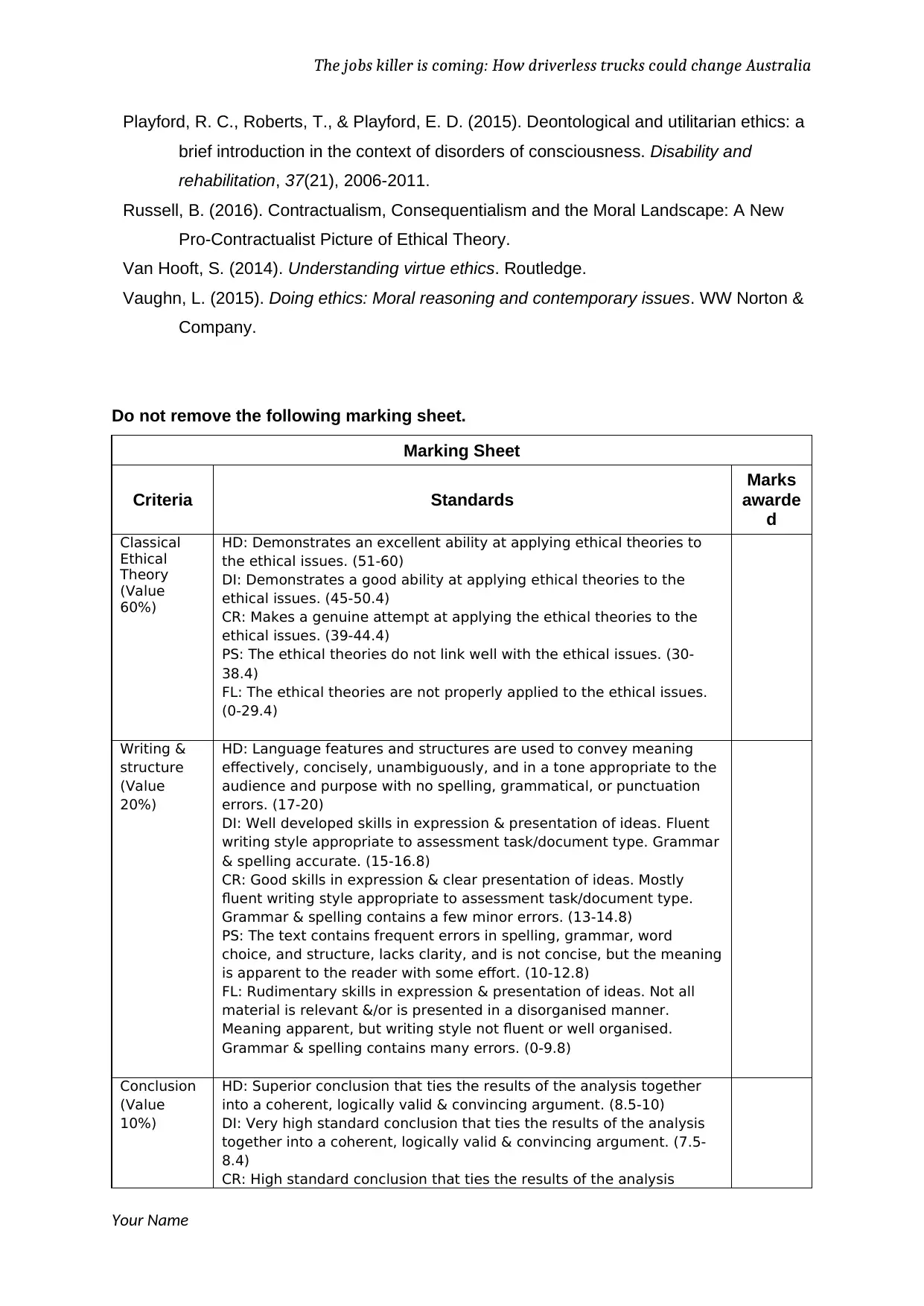
The jobs killer is coming: How driverless trucks could change Australia
Playford, R. C., Roberts, T., & Playford, E. D. (2015). Deontological and utilitarian ethics: a
brief introduction in the context of disorders of consciousness. Disability and
rehabilitation, 37(21), 2006-2011.
Russell, B. (2016). Contractualism, Consequentialism and the Moral Landscape: A New
Pro-Contractualist Picture of Ethical Theory.
Van Hooft, S. (2014). Understanding virtue ethics. Routledge.
Vaughn, L. (2015). Doing ethics: Moral reasoning and contemporary issues. WW Norton &
Company.
Do not remove the following marking sheet.
Marking Sheet
Criteria Standards
Marks
awarde
d
Classical
Ethical
Theory
(Value
60%)
HD: Demonstrates an excellent ability at applying ethical theories to
the ethical issues. (51-60)
DI: Demonstrates a good ability at applying ethical theories to the
ethical issues. (45-50.4)
CR: Makes a genuine attempt at applying the ethical theories to the
ethical issues. (39-44.4)
PS: The ethical theories do not link well with the ethical issues. (30-
38.4)
FL: The ethical theories are not properly applied to the ethical issues.
(0-29.4)
Writing &
structure
(Value
20%)
HD: Language features and structures are used to convey meaning
effectively, concisely, unambiguously, and in a tone appropriate to the
audience and purpose with no spelling, grammatical, or punctuation
errors. (17-20)
DI: Well developed skills in expression & presentation of ideas. Fluent
writing style appropriate to assessment task/document type. Grammar
& spelling accurate. (15-16.8)
CR: Good skills in expression & clear presentation of ideas. Mostly
fluent writing style appropriate to assessment task/document type.
Grammar & spelling contains a few minor errors. (13-14.8)
PS: The text contains frequent errors in spelling, grammar, word
choice, and structure, lacks clarity, and is not concise, but the meaning
is apparent to the reader with some effort. (10-12.8)
FL: Rudimentary skills in expression & presentation of ideas. Not all
material is relevant &/or is presented in a disorganised manner.
Meaning apparent, but writing style not fluent or well organised.
Grammar & spelling contains many errors. (0-9.8)
Conclusion
(Value
10%)
HD: Superior conclusion that ties the results of the analysis together
into a coherent, logically valid & convincing argument. (8.5-10)
DI: Very high standard conclusion that ties the results of the analysis
together into a coherent, logically valid & convincing argument. (7.5-
8.4)
CR: High standard conclusion that ties the results of the analysis
Your Name
Playford, R. C., Roberts, T., & Playford, E. D. (2015). Deontological and utilitarian ethics: a
brief introduction in the context of disorders of consciousness. Disability and
rehabilitation, 37(21), 2006-2011.
Russell, B. (2016). Contractualism, Consequentialism and the Moral Landscape: A New
Pro-Contractualist Picture of Ethical Theory.
Van Hooft, S. (2014). Understanding virtue ethics. Routledge.
Vaughn, L. (2015). Doing ethics: Moral reasoning and contemporary issues. WW Norton &
Company.
Do not remove the following marking sheet.
Marking Sheet
Criteria Standards
Marks
awarde
d
Classical
Ethical
Theory
(Value
60%)
HD: Demonstrates an excellent ability at applying ethical theories to
the ethical issues. (51-60)
DI: Demonstrates a good ability at applying ethical theories to the
ethical issues. (45-50.4)
CR: Makes a genuine attempt at applying the ethical theories to the
ethical issues. (39-44.4)
PS: The ethical theories do not link well with the ethical issues. (30-
38.4)
FL: The ethical theories are not properly applied to the ethical issues.
(0-29.4)
Writing &
structure
(Value
20%)
HD: Language features and structures are used to convey meaning
effectively, concisely, unambiguously, and in a tone appropriate to the
audience and purpose with no spelling, grammatical, or punctuation
errors. (17-20)
DI: Well developed skills in expression & presentation of ideas. Fluent
writing style appropriate to assessment task/document type. Grammar
& spelling accurate. (15-16.8)
CR: Good skills in expression & clear presentation of ideas. Mostly
fluent writing style appropriate to assessment task/document type.
Grammar & spelling contains a few minor errors. (13-14.8)
PS: The text contains frequent errors in spelling, grammar, word
choice, and structure, lacks clarity, and is not concise, but the meaning
is apparent to the reader with some effort. (10-12.8)
FL: Rudimentary skills in expression & presentation of ideas. Not all
material is relevant &/or is presented in a disorganised manner.
Meaning apparent, but writing style not fluent or well organised.
Grammar & spelling contains many errors. (0-9.8)
Conclusion
(Value
10%)
HD: Superior conclusion that ties the results of the analysis together
into a coherent, logically valid & convincing argument. (8.5-10)
DI: Very high standard conclusion that ties the results of the analysis
together into a coherent, logically valid & convincing argument. (7.5-
8.4)
CR: High standard conclusion that ties the results of the analysis
Your Name
⊘ This is a preview!⊘
Do you want full access?
Subscribe today to unlock all pages.

Trusted by 1+ million students worldwide
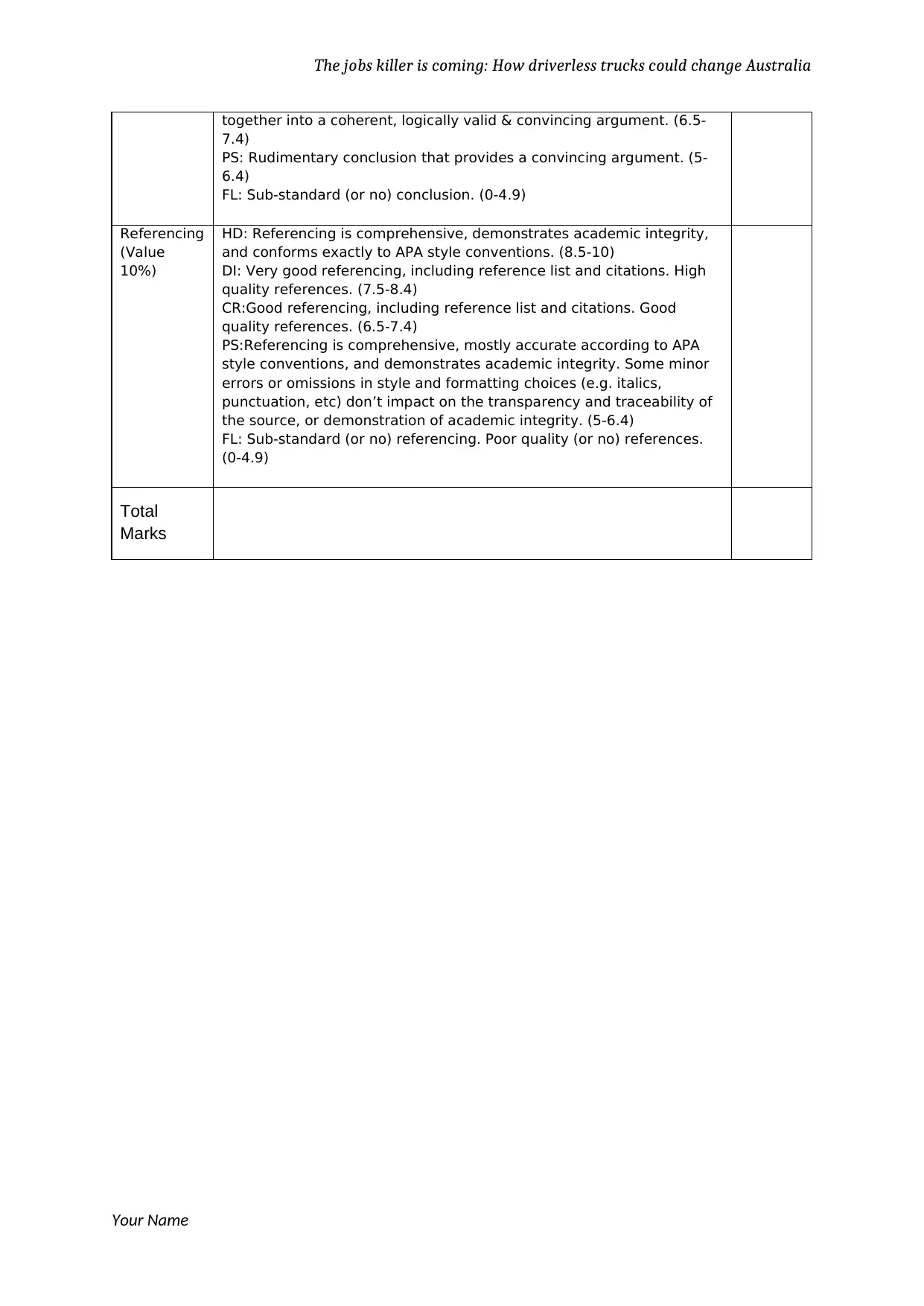
The jobs killer is coming: How driverless trucks could change Australia
together into a coherent, logically valid & convincing argument. (6.5-
7.4)
PS: Rudimentary conclusion that provides a convincing argument. (5-
6.4)
FL: Sub-standard (or no) conclusion. (0-4.9)
Referencing
(Value
10%)
HD: Referencing is comprehensive, demonstrates academic integrity,
and conforms exactly to APA style conventions. (8.5-10)
DI: Very good referencing, including reference list and citations. High
quality references. (7.5-8.4)
CR:Good referencing, including reference list and citations. Good
quality references. (6.5-7.4)
PS:Referencing is comprehensive, mostly accurate according to APA
style conventions, and demonstrates academic integrity. Some minor
errors or omissions in style and formatting choices (e.g. italics,
punctuation, etc) don’t impact on the transparency and traceability of
the source, or demonstration of academic integrity. (5-6.4)
FL: Sub-standard (or no) referencing. Poor quality (or no) references.
(0-4.9)
Total
Marks
Your Name
together into a coherent, logically valid & convincing argument. (6.5-
7.4)
PS: Rudimentary conclusion that provides a convincing argument. (5-
6.4)
FL: Sub-standard (or no) conclusion. (0-4.9)
Referencing
(Value
10%)
HD: Referencing is comprehensive, demonstrates academic integrity,
and conforms exactly to APA style conventions. (8.5-10)
DI: Very good referencing, including reference list and citations. High
quality references. (7.5-8.4)
CR:Good referencing, including reference list and citations. Good
quality references. (6.5-7.4)
PS:Referencing is comprehensive, mostly accurate according to APA
style conventions, and demonstrates academic integrity. Some minor
errors or omissions in style and formatting choices (e.g. italics,
punctuation, etc) don’t impact on the transparency and traceability of
the source, or demonstration of academic integrity. (5-6.4)
FL: Sub-standard (or no) referencing. Poor quality (or no) references.
(0-4.9)
Total
Marks
Your Name
1 out of 7
Related Documents
Your All-in-One AI-Powered Toolkit for Academic Success.
+13062052269
info@desklib.com
Available 24*7 on WhatsApp / Email
![[object Object]](/_next/static/media/star-bottom.7253800d.svg)
Unlock your academic potential
Copyright © 2020–2026 A2Z Services. All Rights Reserved. Developed and managed by ZUCOL.




